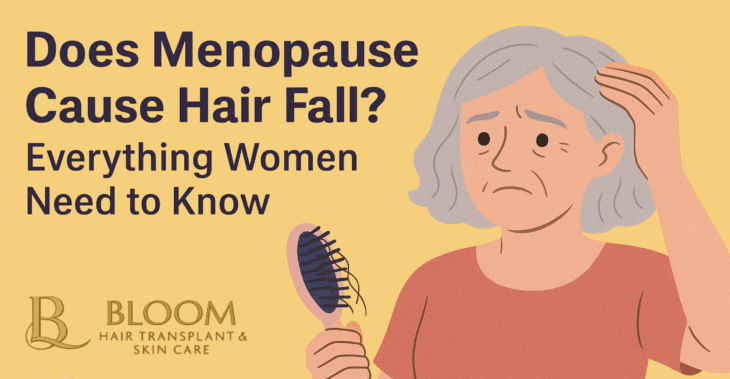
Does Menopause Cause Hair Fall? Everything Women Need to Know
For many women, menopause marks a natural transition in life, bringing both physical and emotional changes. While symptoms such as hot flashes, mood swings, and sleep disturbances are widely recognised, one concern that often goes under-discussed is hair fall during menopause. The sudden thinning of hair, widening part lines, and increased shedding can deeply affect a woman’s sense of identity and confidence.
So, does menopause cause hair fall? The answer is yes – hormonal changes during this stage of life can trigger noticeable hair loss. The good news is, with the right guidance and modern treatments available at specialised clinics like Bloom Hair Transplant, women can successfully restore hair density and regain their self-assurance.
Why Does Menopause Make Your Hair Fall Out?
To understand the link between menopause and hair fall, let’s look at the underlying biological changes.
- Decline in Estrogen and Progesterone: These hormones support hair growth and help follicles stay in their growth phase. As levels drop during menopause, hair becomes thinner and grows more slowly.
- Rise in Androgens: Lower estrogen can make male hormones (androgens) relatively more dominant, causing hair follicles to shrink, leading to thinning at the crown or temples.
- Nutrient Deficiencies: Iron, vitamin D, and biotin deficiencies are more common in midlife, worsening hair fall.
- Stress and Lifestyle: Emotional changes and health shifts during menopause also contribute to shedding.
This explains why many women find themselves losing hair during menopause, even if they never struggled with hair loss earlier in life.
How to Recognise Menopause-Related Hair Loss
Not all hair shedding during midlife is due to menopause. But if you are experiencing:
- Gradual thinning across the scalp
- Hair that feels weaker and breaks easily
- Noticeable scalp visibility at the parting line
- Overall volume loss rather than patches
Here, menopause is likely playing a role. For some, these symptoms may be temporary, while for others they can become progressive without treatment.
Menopause Hair Loss Solutions Every Woman Should Know
The question many women ask is: How to stop hair fall in menopause? While there’s no one-size-fits-all solution, combining medical care, lifestyle adjustments, and advanced treatments offers the best chance of success.
1. Lifestyle and Nutrition Adjustments
- Balanced Diet: Include iron-rich foods, lean proteins, and omega-3 fatty acids to strengthen hair.
- Supplements: Vitamins like D, B12, and biotin support regrowth.
- Stress Management: Yoga, meditation, or simple relaxation can improve overall hair health.
These steps won’t stop hair loss entirely, but they create the foundation for healthier follicles.
2. Medical and Non-Surgical Treatments
- Topical Minoxidil: Helps stimulate hair follicles and slow down shedding.
- Hormonal Support Therapy: Under medical supervision, some women benefit from HRT to restore hormonal balance.
- PRP Therapy (Platelet-Rich Plasma): A non-surgical option where your own plasma is injected into the scalp to trigger regrowth. At Bloom Hair Transplant, PRP has been a successful solution for women seeking natural density.
- Laser Therapy: Low-level lasers improve blood circulation and encourage follicle activity.
3. Hair Transplant for Women at Bloom
For women who experience severe thinning or long-term shedding, advanced hair transplant procedures offer a permanent and natural solution. At Bloom Hair Transplant, we specialise in women’s hair restoration, with techniques customised to suit female patterns of thinning.
- FUE (Follicular Unit Extraction): A minimally invasive method that transplants healthy follicles to thinning areas.
- Customised Design: Female hairlines are carefully crafted for a soft, natural look.
- Permanent Results: Once transplanted, follicles continue to grow for a lifetime, unaffected by hormonal fluctuations.
Unlike temporary fixes, a hair transplant at Bloom restores both hair and confidence.
Menopause Hair Loss Regrowth Success – What’s Possible?
Women often wonder if regrowth after menopause is achievable. The answer is yes, with the right combination of treatment. Many patients at Bloom Hair Transplant have experienced:
- Thicker, healthier hair within 6–12 months
- A natural increase in volume and density
- Renewed self-confidence in both personal and professional life
By pairing medical management of menopause with advanced solutions like PRP or transplants, women can achieve lasting regrowth success.
Why Choose Bloom Hair Transplant?
At Bloom, we understand that hair is more than just aesthetics – it’s a vital part of identity. Led by Dr Vinod Sonawane, one of India’s leading hair restoration surgeons, Bloom offers:
- Expertise in Female Hair Transplants
- State-of-the-Art Technology for minimally invasive and comfortable treatments
- Comprehensive Approach: Addressing both medical and cosmetic aspects of hair loss
- Proven Success Stories of women who regained confidence post-menopause
When you choose Bloom, you’re not just choosing a treatment, but a partner who understands your journey.
Reclaim Your Hair, Reclaim Your Confidence
So, does menopause cause hair fall? Yes – but it doesn’t have to be the end of your hair story. Whether it’s losing hair during menopause, wondering “does menopause make your hair fall out?”, or searching for effective menopause hair loss solutions, there are proven ways forward.
At Bloom Hair Transplant, we empower women to take control with advanced treatments – from PRP to transplants – for results that last a lifetime.
Don’t wait for hair loss to define you. Book your consultation with Bloom today and take the first step toward a fuller, more confident you.

